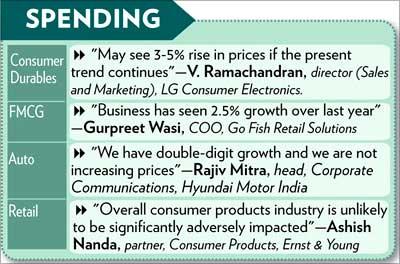|
|
| Help | |
| You are here: Rediff Home » India » Business » Special » Features |
|
| ||||||||||||||||||||||||||||||||||||||||||||
|
| ||||||||||||||||||||||||||||||||||||||||||||
As Indians learn to live with an economy that is growing, although slower than before, there are some realities that they will have to get accustomed to. The first of these is that salaries will not rise as fast as they did over the last few years, especially in technology and other export-oriented sectors. So disposable income will grow slower.
Food. The biggest evidence of wholesale price inflation, which has been holding above 7 per cent for the last two weeks ending 5 April, has been in the prices of food, including fresh foods, grains and edible oils. The higher price of primary foods has pushed up prices of products that use them as raw materials.
Chains like McDonald's and Domino's have increased prices. While Domino's has increased the price of its pizzas by up to 5 per cent, McDonald's has started charging Rs 10 more for its popular Chicken McGrill burger. Overall, the higher price of food has left less disposable income for other items.
FMCG. Most of the other items common in the grocery bag can be lumped under fast-moving consumer goods. As of now, their prices have been raised little or not at all. To that extent, they should not require a greater outlay and are likely to remain unaffected. Ashish Nanda, partner, consumer products practice, Ernst & Young, has an optimistic outlook for the overall sector: "In the long-term, FMCG is likely to witness good growth owing to low penetration levels and increasing urbanisation."
Travel. While FMCG is untouched, some sectors are positively booming. The travel industry, for instance. Deep Kalra, founder and CEO of MakeMyTrip.com, an online travel portal, says, "As a matter of fact, the online travel industry is booming." However, many of the costs are rising too.
Airfares have risen steadily on the back of increasing crude prices. Cost of surface transport has been artificially kept down by the government, but it may not be possible to sustain this much longer with global crude prices at $114 a barrel. Expect to spend more here.
 Durables. These, including automobiles, are usually big-ticket, discretionary buys that are often loan financed. Increases in interest rates over the last year have not been helping them at all. According to industry forum Ficci, the consumer durable sector shrank by 1.7 per cent, during April 2007-January 2008.
Durables. These, including automobiles, are usually big-ticket, discretionary buys that are often loan financed. Increases in interest rates over the last year have not been helping them at all. According to industry forum Ficci, the consumer durable sector shrank by 1.7 per cent, during April 2007-January 2008.
In the previous corresponding period, it grew by 10.6 per cent. But stimulating sales by cutting prices over and above the declining trend does not look like an option in the face of rising input prices.
On the whole, it appears that primary food items and credit are likely to cost more, but not manufactured products. Retail analysts feel that the slowdown and inflation are short-term blips.
G Srivatsava, director and head, economic policy, Confederation of Indian Industry, says: "If growth continues at 7-9 per cent, the spending and saving behaviour is unlikely to change."
More Specials
Powered by

|
|
| © 2008 Rediff.com India Limited. All Rights Reserved. Disclaimer | Feedback |